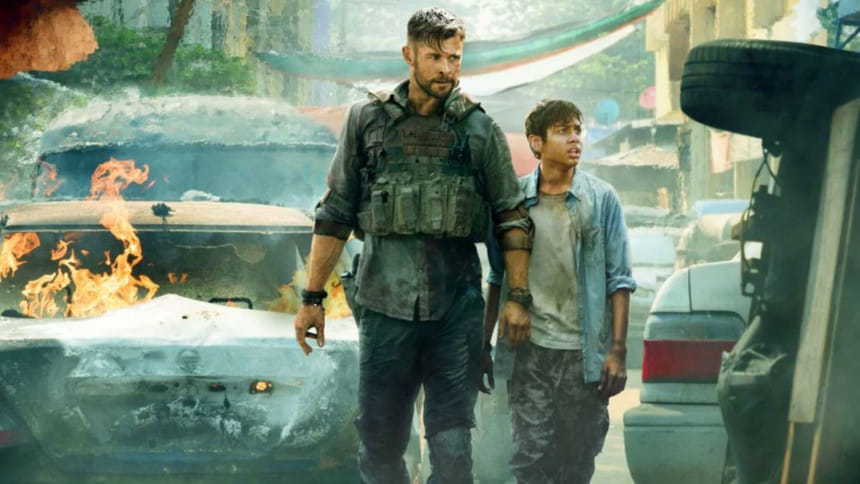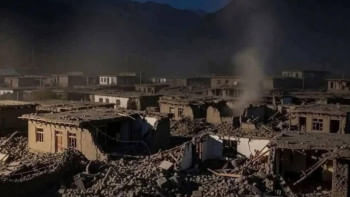The ‘Extraction’ Attraction

My Face-book newsfeed has been experiencing a little tremor ever since the Dhaka-based action movie Extraction started streaming on Netflix on April 24. Surprisingly, the ground shaking "thor-thor" is not due to the much hyped presence of Chris Hemsworth and his marvellous reputation as an avenger; instead, social media is abuzz with Dhaka being misrepresented by Hollywood.
Not too often do we get to hear Bangladesh and Hollywood in the same sentence. There was a time when the popular BTV variety show Jodi Kichu Mone Na Koren featured a Hollywood based reporter to give media updates in the pre-internet era. There have been documentaries—such as The Human Scale (2012) dealing with the problematic expansion of megacity or The True Cost (2015) exploring the condition in which clothes are made for the fashion world—that shed light on Dhaka. Dhaka is mentioned in passing in TV shows such as "How I Met Your Mother" where Ranjit the taxi driver is said to be from Bangladesh. Evan Treborn in The Butterfly Effect (2004) worries about waking up in a "dirt farm" in Bangladesh. In Friends with Benefits (2011) we hear of Bangladesh in a sarcastic list of countries that tops America in work ethics. Zoolander (2011) mentions Bangladesh in the context of child labour. In Spielberg's Munich employs the comment: "enough food to feed Bangladesh". And in one episode of Simpsons, Krusty the clown finds an old record from Bangladesh and is kicked out of the house for playing it!I am sure there are a few odd references here and there that I have missed. Suffice it to say, the presence of Bangladesh in Hollywood films is far from flattering.
The fact that Extraction has gained traction in Bangladesh to become number one Netflix choice is no wonder. Never mind that it is a mindless action movie with endless spewing of bullets running through a ridiculous storyline.
The plot involves [skip if you plan to watch the movie] an Indian drug lord who is in jail. His son stays with his security chief Saju in Mumbai in a massive palatial house. The boy Ovi is kidnapped by a rival drug kingpin from Bangladesh. Asif is a dandy young man who runs a racketeer of drug-peddlers reminding one of the scantily dressed characters with invectives aplenty from Slumdog Millionaire.
Saju hires an Australian extractor Rake, a psychological wreck who suffers from the trauma of losing his son to cancer and ends up killing someone with a garden rake to live up to his name. Tyler undertakes this mission impossible to Dhaka with a death wish. Within 16 hours, the entire rescue team takes position in a launch in the Buriganga River, while he alone goes to pay the ransom to free Ovi. Killing spree, high speed car chase, road blockades, and door to door search in narrow alleys ensued as Rake rescues Ovi.
Meanwhile, Saju secretly comes to Dhaka on a chartered plane from Mumbai with an intention of double-crossing the rescue mission. He kills Tyler's rescue party. Don't ask why Saju, who could kill an entire international mercenary gang, bothered to hire secondary forces to deal with some street ruffians? Don't be distracted by the mindless plot—keep watching, and you may even end up being proud of Ananta Jalil.
Tyler and Ovi thus end up being chased by Asif's gang, Asif's pet police (a combination of DMP, RB elite and the army) and Saju. For the first time ever in the history of mankind, we get an insight into Dhaka's box culverts, "the world's worst sewage" through which the duo escaped and was later picked up by a western handler and taken to a safe house. Ovi had to kill the handler to save Tyler from his greedy friend. They are again on the streets in search of the pickup point. After hundreds of cars, CNG wheelers being destroyed, bodies being dropped, rocket launchers being hurled, a helicopter being smashed over Demra bridge, the hero and his foil being dead (Tyler will be dead unless a sequel is required), the boy is saved by Tyler's back up team. The final action on the bridge is conveniently watched by Asif from his palace with simple binoculars, while his lackey colonel goes in and out of action to coordinate the chase.
The movie has been hailed for its close encounter combats and the daring "oner". Sam Hargrave, the debutant director famed for his stunts in Marvel movies, straps himself on the bonnet of a car to film a long-form "one-shot" spanning 12 minutes to cover a car chase, a foot chase, another car chase, gun battles, knife battles, hand-to-hand combat, and plenty of explosions. Evidently, the "oner" failed to impress our sulky viewers who were in no mood to stomach the negative portrayal of Dhaka.
Some have commented on the yellow filter that has been used to present Dhaka as a sickly, exotic location. Others have been disturbed by the configuration of Dhaka as a failed state where a drug lord can employ a senior army officer to brew a cocktail of armed forces and spray them over the intruders only to be killed like mosquitoes by a wanton boy. There is no meeting of the Defence Ministry or call from the political leadership: a bunch of heavily armoured uniformed men engage in a wild goose chase while being killed by the dozens in the process. Since when are our national security decisions involving foreigners taken inside a criminal's den? Valid question.
Well, mindless action genres set in Bangkok, Lagos, Somalia, Taiwan, Vietnam, Mexico, Brazil and the like need these poverty-stricken slums to catch the imagination of the west. We, the people of The Third World, offer an ugly canvas against which the conflicted hero's moral dilemma can be portrayed. I do not think we have objected to such stereotyping of other countries and races earlier. So what makes us become so sensitive now?
This reminds me of a particular scene from Rush Hour in which Jackie Chan greets a black man as "Whats'up my nigga" and gets attacked. He was trying to be "kool" like his black partner Chris Tucker. I guess it's alright for us to ritually disown our own city, discredit it, make fun of it, keep it untidy—but the moment an outsider does so, we become defensive.
Let me be very blunt: don't expect Dhaka to be portrayed beautifully unless you can make it beautiful. Admit the fact that the part of the city that has been portrayed is dusty and dirty. The aerial shot at the beginning does capture the essence of the concrete jungle in which we live. The simulated sets in Ahmadabad or Bangkok are no different. This is how we are: unless we change our city, we will look like the way we are. Stop expecting "edit options" everywhere to make yourself unrealistically attractive.
I think a more important question that we can ask is why a film on Dhaka is devoid of Bangladeshi actors. The Dakaiya accents attempted by the Indian actors were gibberish to say the least. Even the way Chris Hemsworth demanded, "proman dao" was better Bangla than any one of those Indian actors. The Hindi songs and cabaret dance too were also out of joint.
We understand the film had a local partner, but their involvement is very hazy. The credit-line shows few locals in the technical team. Indeed we need to ask why the film was not shot in Dhaka except for the footages needed for chroma key compositing. The involvement of our local actors, agencies would have made it a much more credible production. We need more efficient translators, creative writers, bi-lingual actors, film critics so that the west takes us seriously. The anthology Sincerely Yours, Dhaka (2018) on Netflix and some other non-mainstream movies are slowly generating a trickle of cultural capital that we need for future ventures.
There is no point in being angry at an angry movie. Let us take a step back: think of better ways of branding Dhaka. I think Turkey can be a good role model. Turkish Airlines has used Ridley Scott to make The Journey, which is now being used as a promotional video for Istanbul. Then there are some wonderful Turkish movies and serials on Netflix that show the modern and urban sides of the country. If we think that the only way we can represent Bangladesh before the western world is by presenting our villages and poverty at the Cannes film festival, then the west will also not think of us as anything more than an exotic location caught in a time-warp. Finally, a note on the market. If we are mindful about what we consume and patronise, the market will yield a different representation. Mind it, it is our custom that has made Extractor the number one Netflix choice in Bangladesh. If we can prove to the world that we have a sensible market large enough to patronise Hollywood, surely there will be substantial change in the way we are represented.
Shamsad Mortuza is a professor of English, University of Dhaka (now on leave). Currently, he is Pro-Vice-Chancellor of ULAB. Email: [email protected]

 For all latest news, follow The Daily Star's Google News channel.
For all latest news, follow The Daily Star's Google News channel. 



Comments